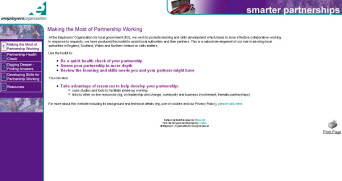Tag: good practice
We produced regular bi-monthly issues of the Learning to Deliver Digest which brought together developments in policy and practice relevant to managers and practitioners whose roles concern driving change and improvement in partnership settings. The last in the series was in
November 2009 (

339KB).
Web links were provided for all items mentioned. Signposted documents included not only official publications and websites but also a variety of other materials which help readers ‘keep up with and ahead of the game’.
Each Digest featured notes on a handful of key developments in recent weeks and a section dedicated to LAA matters. These are followed by a fuller list of documents, tools and other resources – ranging across central and local government; climate change; community empowerment; community safety; children and young people; economic development, skills and worklessness; health; housing; neighbourhood renewal and social exclusion; planning & transport; rural development; and the third sector. There were also cross-cutting themes of efficiency and improvement; community empowerment; and equality, diversity and cohesion.
The Digest was produced for the Learning to Deliver programme (Improvement and Efficiency West Midlands) and was funded by Communities and Local Government.
Permanent link to this article: https://www.educe.co.uk/?p=190
Changing Practices: A Good Practice Guide for Businesses Locating in Deprived Areas – a case study-based guide highlighting how businesses can adapt their practices to bring benefits for the company and benefits for the community in regeneration areas. Produced for the British Retail Consortium and the then ODPM Neighbourhood Renewal Unit, and published by Communities and Local Government (
Research Report 6 
pdf 794KB).
Also Part 2
Case studies (

pdf 794KB) and
Summary (

pdf 138KB)
Permanent link to this article: https://www.educe.co.uk/?p=179
Renewal.net was developed by the then Neighbourhood Renewal Unit as an on-line guide to what works in neighbourhood renewal. Published by the Department for Communities and Local Government, it included topic overviews, how to guides, case studies, project summaries and much more. Educe contributed subject overviews in the ‘Reviving Local Economies’ theme, on Business Development; Land, Property and Planning; and Engaging Employers – along with a number of case studies. Other items include an overview on Data Sharing, and a case study of Data Sharing and the Wigan and Leigh Community Safety Partnership (2005). Most Renewal.net documents were subsequently incorporated into the IDeA Partnerships and Places Library.
Permanent link to this article: https://www.educe.co.uk/?p=178
We developed the
Smarter Partnerships interactive website to help users improve partnership skills and performance, on behalf of the Employers Organisation for Local Government which at the time had responsibility for skills development in the sector. When this became part of the Local Government Association the site unfortunately was no longer maintained, despite evidence of continuing use.

Smarter Partnerships provided:
- tools to assist individuals, cross-agency teams and partnerships assess both (i) partnership development and (ii) individual and team learning needs.
- on-line resources: case studies, tools and links to help users address learning needs and improve partnership working
Smarter Partnerships was unusual for a diagnostic tool, in that not only did it help the user clarify their needs, but also provided practical suggestions for actions to take tailored to their particular needs.The project was originally funded by the then Department for Education and Skills, and built on a
‘state of the art’ review in 2000 of partnerships and local government.We also made presentations and run workshops linked to Smarter Partnerships, eg, for Bedfordshire Strategic Service Delivery Partnership, CIPFA Scotland, Essex County Council (Scrutiny), HM Treasury ‘Invest to Save’ annual conference, and the Home Office Immigration and Nationality Department.
Permanent link to this article: https://www.educe.co.uk/?p=210

 Smarter Partnerships provided:
Smarter Partnerships provided: